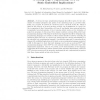Free Online Productivity Tools
i2Speak
i2Symbol
i2OCR
iTex2Img
iWeb2Print
iWeb2Shot
i2Type
iPdf2Split
iPdf2Merge
i2Bopomofo
i2Arabic
i2Style
i2Image
i2PDF
iLatex2Rtf
Sci2ools
FOSSACS
1999
Springer
1999
Springer
A Strong Logic Programming View for Static Embedded Implications
Abstract. A strong (L) logic programming language ([14, 15]) is given by two subclasses of formulas (programs and goals) of the underlying logic L, provided that: firstly, any program P (viewed as a L-theory) has a canonical model MP which is initial in the category of all its L-models; secondly, the L-satisfaction of a goal G in MP is equivalent to the L-derivability of G from P, and finally, there exists an effective (computable) proof-subcalculus of the L-calculus which works out for derivation of goals from programs. In this sense, Horn clauses constitute a strong (first-order) logic programming language. Following the methodology suggested in [15] for designing logic programming languages, an extension of Horn clauses should be made by extending its underlying first-order logic to a richer logic which supports a strong axiomatization of the extended logic programming language. A well-known approach for extending Horn clauses with embedded implications is the static scope prog...
FOSSACS 1999 | Horn Clauses | Logic Programming Language | Software Engineering | first-order Logic |
| Added | 04 Aug 2010 |
| Updated | 04 Aug 2010 |
| Type | Conference |
| Year | 1999 |
| Where | FOSSACS |
| Authors | R. Arruabarrena, Paqui Lucio, Marisa Navarro |
Comments (0)

